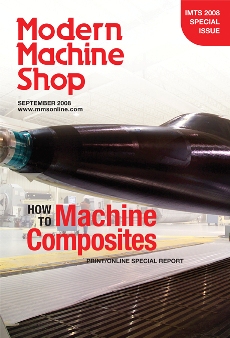 Modern Machine Shop first "modern-digest size" issue (September 2008) | |
| Type | Business magazine |
|---|---|
| Format | Monthly paper and online magazine |
| Owner | Gardner Business Media Inc. |
| Publisher | Bryce Ellis |
| Editor | Brent Donaldson |
| Founded | 1928 |
| Language | English |
| Headquarters | Cincinnati, Ohio |
| Circulation | 98,571 |
| ISSN | 0026-8003 |
| Website | www.mmsonline.com |
Modern Machine Shop (ISSN 0026-8003) is a media brand that reports on product and process technology being used in North America's CNC machining and metalworking industry. Modern Machine Shop's audience consists primarily of owners, managers, and engineers at OEMs, contract manufacturers, and job shops that machine for industries including automotive, aerospace, electronics, energy, medical/surgical, defense, and construction equipment. [1]